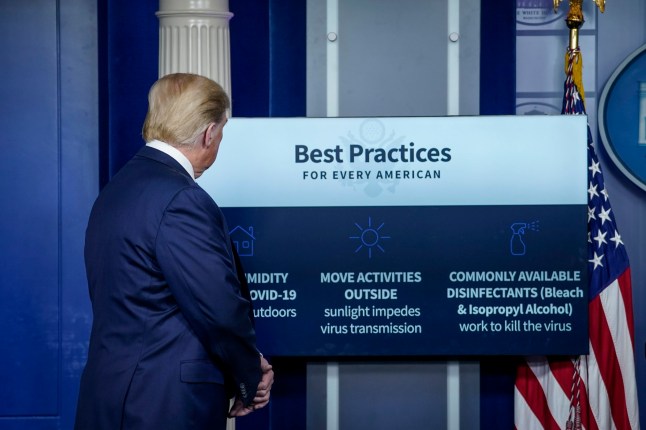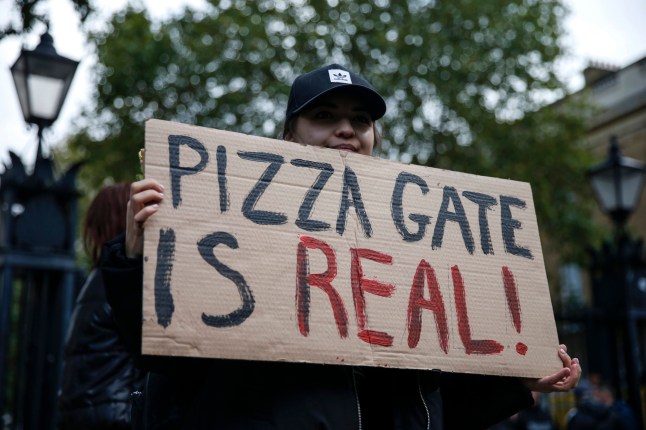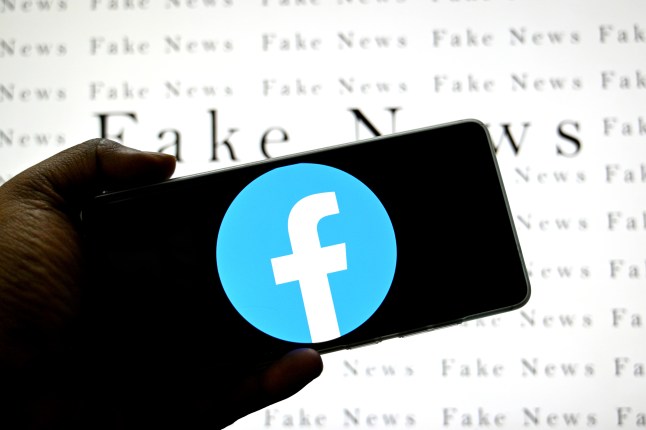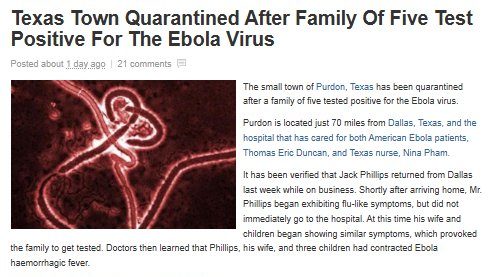
‘Fake news’,as misinformation is often known,can have real-world impacts (Picture: AFP)
‘The truth is going to help you live longer.’
This is what journalist and broadcaster Emily Maitlis said at a recent panel discussion that asked a simple-sounding question: ‘Can truth survive?’
For Maitlis,ensuring the truth survives during an age of AI-generated images and high-definition deepfakes is about ‘prolonging life’.
She told the Sir Harry Evans Investigative Journalism Summit on May 6: ‘Quite frankly,misinformation kills you.’
The former newscaster added: ‘If you ignore the truth,if you start believing the lies,if you,dare I say,inject the bleach,that is not going to end up well for you.’
https://www.instagram.com/reel/DJj4WH8IGBy/
Here are six times when fake news made the world a worse place to live.
 Trump at a daily briefing of the coronavirus task force at the White House in April 2020 (Picture: Getty Images North America)Only weeks into the coronavirus pandemic,US President Donald Trump had a rather novel idea to curb the spread of this strange new disease.Injecting a disinfectant like bleach or isopropyl alcohol into people’s bodies.Trump rambled: ‘Is there a way we can do something like that,by injection inside or almost a cleaning? Because,you see,it gets in the lungs and it does a tremendous number on the lungs.’The comments were criticised by the medical experts,who stressed that consuming or injecting disinfectant risks poisoning and death. There was a 121% increase in referrals for accidental ingestion of household disinfectants afterwards.Full Fact,a UK fact-checking charity,told Metro that phoney health claims are among the most stubborn forms of misinformation.‘Misinformation about health continues to spread widely across social media,undermining confidence in established medical practices and our public health institutions,’ it said.‘In recent years,we have seen the spread increase across newer platforms and unregulated media spaces like podcasts.‘While not illegal,health misinformation like fake cancer cures and false testimonials about dangerous unproven therapies can be immensely harmful and so requires urgent action from government,regulators,and online platforms to spot and stop its spread.’
Trump at a daily briefing of the coronavirus task force at the White House in April 2020 (Picture: Getty Images North America)Only weeks into the coronavirus pandemic,US President Donald Trump had a rather novel idea to curb the spread of this strange new disease.Injecting a disinfectant like bleach or isopropyl alcohol into people’s bodies.Trump rambled: ‘Is there a way we can do something like that,by injection inside or almost a cleaning? Because,you see,it gets in the lungs and it does a tremendous number on the lungs.’The comments were criticised by the medical experts,who stressed that consuming or injecting disinfectant risks poisoning and death. There was a 121% increase in referrals for accidental ingestion of household disinfectants afterwards.Full Fact,a UK fact-checking charity,told Metro that phoney health claims are among the most stubborn forms of misinformation.‘Misinformation about health continues to spread widely across social media,undermining confidence in established medical practices and our public health institutions,’ it said.‘In recent years,we have seen the spread increase across newer platforms and unregulated media spaces like podcasts.‘While not illegal,health misinformation like fake cancer cures and false testimonials about dangerous unproven therapies can be immensely harmful and so requires urgent action from government,regulators,and online platforms to spot and stop its spread.’ ‘PizzaGate’ is an infamous conspiracy theory (Picture: Getty Images Europe)In 2016,Edgar Maddison Welch drove 350 miles from his home in North Carolina to Comet Ping Pong,a pizza restaurant in Washington.The actor,however,wasn’t there to grab a slice. He opened the doors and fired three shots from a military-style assault rifle that struck the restaurant’s walls,a desk and a door.Maddison said he was there to ‘self-investigate’ because he believed the pizzeria was harbouring young children as sex slaves as part of a child-abuse ring led by Hillary Clinton.This baseless belief,called PizzaGate,stemmed from social media and far-flung web forums and was amplified by high-profile conspiracy theorists and right-wing blogs.As he later told The New York Times,Maddison sincerely believed Comet was at the centre of a sex ring after reading the bogus claims online.‘The intel on this wasn’t 100%,’ he admitted.
‘PizzaGate’ is an infamous conspiracy theory (Picture: Getty Images Europe)In 2016,Edgar Maddison Welch drove 350 miles from his home in North Carolina to Comet Ping Pong,a pizza restaurant in Washington.The actor,however,wasn’t there to grab a slice. He opened the doors and fired three shots from a military-style assault rifle that struck the restaurant’s walls,a desk and a door.Maddison said he was there to ‘self-investigate’ because he believed the pizzeria was harbouring young children as sex slaves as part of a child-abuse ring led by Hillary Clinton.This baseless belief,called PizzaGate,stemmed from social media and far-flung web forums and was amplified by high-profile conspiracy theorists and right-wing blogs.As he later told The New York Times,Maddison sincerely believed Comet was at the centre of a sex ring after reading the bogus claims online.‘The intel on this wasn’t 100%,’ he admitted. Far-right activists hold an ‘Enough is Enough’ protest in August in Sunderland (Picture: Getty Images)In August,racist rioting flared in more than a dozen towns and cities across England and in Northern Ireland.The spark was anger over the killing of three children at a dance and bracelet-making class for Taylor Swift fans in Southport.Far-right social media users began claiming the killer had an Arabic-sounding name and was a Muslim asylum seeker who had illegally arrived in the country by boat.Just one day after the stabbing,far-right activists tore through a vigil in Southport,attacking a mosque,hurling bricks and setting cars on fire.Libraries,food banks and hotels housing asylum seekers were burned by the rioters who chanted ‘enough is enough’ and ‘stop the boats’.
Far-right activists hold an ‘Enough is Enough’ protest in August in Sunderland (Picture: Getty Images)In August,racist rioting flared in more than a dozen towns and cities across England and in Northern Ireland.The spark was anger over the killing of three children at a dance and bracelet-making class for Taylor Swift fans in Southport.Far-right social media users began claiming the killer had an Arabic-sounding name and was a Muslim asylum seeker who had illegally arrived in the country by boat.Just one day after the stabbing,far-right activists tore through a vigil in Southport,attacking a mosque,hurling bricks and setting cars on fire.Libraries,food banks and hotels housing asylum seekers were burned by the rioters who chanted ‘enough is enough’ and ‘stop the boats’. A nurse administers a dose of the Pfizer-BioNTech Covid-19 vaccine to a patient (Picture: AF)Brain-controlling microchips,DNA-altering nanobots and dangerous metals that can leave people sterile.These are just some of the things that viral social media posts and videos baselessly claimed were inside coronavirus vaccines.The coronavirus pandemic saw conspiracy theories thrive,casting doubt on the existence or seriousness of the disease. The World Health Organization dubbed it an ‘infodemic’.Some myths were seemingly well-intentioned,like peddling miracle cures or wishful thinking,the University of Melbourne said.But the pandemic saw disinformation,spread intentionally by people in bad faith,run rampant as people blamed minority groups or 5G towers for the pandemic.This wave of fake news,researchers said,likely killed hundreds of people. Whether they were trying out supposed medical information or believed the virus was a hoax so never sought treatment.
A nurse administers a dose of the Pfizer-BioNTech Covid-19 vaccine to a patient (Picture: AF)Brain-controlling microchips,DNA-altering nanobots and dangerous metals that can leave people sterile.These are just some of the things that viral social media posts and videos baselessly claimed were inside coronavirus vaccines.The coronavirus pandemic saw conspiracy theories thrive,casting doubt on the existence or seriousness of the disease. The World Health Organization dubbed it an ‘infodemic’.Some myths were seemingly well-intentioned,like peddling miracle cures or wishful thinking,the University of Melbourne said.But the pandemic saw disinformation,spread intentionally by people in bad faith,run rampant as people blamed minority groups or 5G towers for the pandemic.This wave of fake news,researchers said,likely killed hundreds of people. Whether they were trying out supposed medical information or believed the virus was a hoax so never sought treatment.Why do people believe fake news?

The internet has made information – and lies – more accessible than ever before (Picture: Getty Images)
There’s a simple reason why so many of us are duped into sharing phoney Facebook posts or mistaking a doctored news article as genuine.
Zorzeta Bakaki,a senior lecturer in political science at the University of Essex,told Metro: ‘Social media platforms inundate users with a constant stream of information,leading to what’s termed “information overload.”
‘This overwhelming influx can impair our ability to process and evaluate information effectively.’
The associate professor added that repeated exposure to trumped-up stories can make them believable. This is called the ‘illusory truth effect’.
‘Repeated exposure to the same piece of misinformation can increase its perceived accuracy,a cognitive shortcut our brains use to assess truthfulness,’ said Bakaki. ‘This effect is particularly potent on social media,where algorithms may repeatedly expose users to the same content.’

Supporters of US President Donald Trump hold a rally outside the US Capitol on January 6,2021 (Picture: AFP)
On January 6,2021,a mob stormed the Capitol building over the results of the US Presidential Election,where Joe Biden beat Trump.
Rioters wearing red,white and blue broke windows,beat police and vandalised offices. Five people died.
The violent,anti-democratic attack erupted after Trump published a string of inaccurate and inflammatory posts claiming the vote was fixed.
But Trump’s claims of election fraud weren’t anything new – he had for weeks been urging supporters to go to Washington to stop the certification of the election results.
The false claims ‘radicalised’ hundreds into rioting to such an extent,one researcher told Reuters,that they were living in a ‘completely alternative reality’.
‘They’re not just sitting at home in their pyjamas clicking,“yes I agree,”‘ saidClaire Wardle,co-founder of anti-disinformation non-profit First Draft
‘They’re out there with… guns and pipe bombs.’

Fact-checkers have long raised eyebrows at satirical,fake news websites (Picture: National Report)
In 2014,the National Report published an article claiming that a family of five living in Purdon,Texas,had been quarantined.
They had tested positive for Ebola,an aggressive,often fatal virus that destroys people’s blood vessels.
Readers in the comments described how health officials had cut off connection to the town and that the military ‘is everywhere’,according to internet archives seen by Metro.
But the thing is,none of this was true.
The National Report is a fake news website,often pushing out cynical political satire. Yet the Purdon story lacked a disclaimer in the body of the text that identified it as satire,duping even a few national broadcasters.
Some 337,000 people shared the story on Facebook alone,according to the media database Muck Rack.
At the time,parts of Africa were dealing with 30,000 cases of the virus,which had killed 11,000 people. Fact-checkers and local officials had to try to reassure edgy Americans that there was nothing to worry about – the US would see four imported cases and one death during the entire epidemic.
While it’s safe to say fake news isn’t going away anytime soon,Bakaki said that there are a few things people and those in power can do.
She said: ‘Combating misinformation requires a multifaceted approach: Media literacy education equips individuals with the skills to critically evaluate information sources,enabling them to discern credible content from falsehoods.
‘Prebunking techniques – proactively exposing individuals to weakened forms of misinformation – can build “mental immunity,” making them more resistant to false information.’
Social media titans,she added,must roll out ‘read before you share’ notifications to ensure people know what they’re about to blast to all their followers is,in fact,accurate.
Bakaki added: ‘Encouraging reflective thinking over impulsive reactions further enhances individuals’ ability to assess information credibility effectively.’
United News - unews.co.za